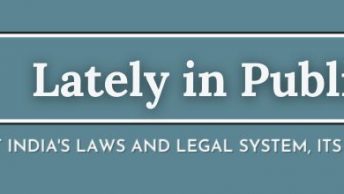A fortnightly feature inspired by I-CONnect’s weekly “What’s New in Public Law” feature that addresses the lacuna of a one-stop-shop public law newsletter in the Indian legal space.
What’s new at LAOT
1. Aadi Belhe and Sarthak Agarwal, Barren Land: Frequent crashes and uncertain recourse Part I and II (This article argues that in case loss to property is suffered by a person due to a crash involving a State-owned airborne object, then such a victim will be hard pressed to obtain compensation in private law)
2. Rehan Mathur, Narcotics and Reverse Onus Clauses: Arguing for the Presumption of Innocence under the NDPS Act (argues against reverse onus clauses, both theoretically and pragmatically, to establish that such clauses lead to some unimagined and undesirable consequences)
Lately in Academic Articles
1. Zaheer Ali, Secularism Under Siege Revisiting the Indian Secular State, Routledge (analyzes secularism in India, especially in light of the disconnect between a modern secular state and a conservative society, India’s history and the way it is politicized).
2. Aditya Suswaram, The Discrimination and Anomaly in the Property Rights of Indian Women, Statute Law Review (analyzes the constitutionality of proviso 10 to the Transfer of Property Act which restraints women of certain religious backgrounds from alienating property received from an inter-vivos transaction).
3. Sejal Chandak, Continuing Discrimination in the times of technology: Women, Work, Algorithms and Law in India, Indian Journal of Law and Technology (examines the need for a legal framework to prevent gender-based algorithmic discrimination in workplaces, and the lack of regulations in this sphere).
4. Abdul Shakoor Chandio, Fayaz Hussain Tunio & Abdul Ghaffar Korai, Federalism in South Asia: a constitutional analysis of India and Pakistan, Cogent Arts & Humanities (examines and compares the history and constitutional structure of federalism adopted in India and Pakistan).
5. G.R. Srikkanth, Sanjay Yadav & K.I Pavan Kumar, The Intersection of Food Laws and Legal Metrology Laws in India: A Framework for Analysis, MAPAN (examines the intersection of food laws and legal metrology laws, identifying conflicts and proposing measures to harmonize these regulations to enhance efficiency).
6. Wen-Chen Chang, Kelley Loper, Mara Malagodi, & Ruth Rubio-Marín, Gender, Sexuality and Constitutionalism in Asia, Bloomsbury (examines the diversity of constitutional responses to sex, gender and sexuality in Asia from a comparative perspective, including a chapter on jurisprudence in India by Gautam Bhatia, and Shreya Atrey).
Blog
1. Muskan Tibrewala, The phantasm of ‘feticide’ – On the Delhi High Court’s abortion order in R v. Union of India, Indian Constitutional Law and Philosophy.
2. Karthik Ravichandran, The Election Commission and the Pune By-Poll Evasion, Indian Constitutional Law and Philosophy.
3. Alok Prasanna Kumar, A Powerful Internal Critique, Economic and Political Weekly.
4. Siddharth Malik and Navjot Punia, Choice, Volition, Participation, Consent — Appraisal of a Minor’s Consent in Child Sexual Abuse Cases, The Proof of Guilt.
5. Gautam Bhatia, The Indian Constitution through the Lens of Power – VI: Rights, I.CONnect Blog.
6. Aarathi Ganesan, Into The Unknown: Search And Seizure Of Digital Devices In India, Medianama.
7. Manas Raturi, The Sanatanists and the Constituent Assembly, Pluralist Agreement and Constitutional Transformation (PACT).
8. Anand Grover, Interview with Adila Hassim, counsel for South Africa versus Israel before the ICJ, The Leaflet.
Podcasts
1. Ananya Desai and Rakshith Shetty, One Nation One Election – Feasibility and Implications for India, All Things Policy (discussing the compatibility of simultaneous elections with the federal structure of India).
2. PDT Achary, Sreehari Aney, Sunil Baghel and Bhavika Jain, Does India’s anti-defection law need more teeth?, The Times of India Podcast (decoding what the Maharashtra speaker’s verdict in the Shiv Sena split says about India’s anti-defection law).
3. Asad Rehman, Apurva Vishwanath and Shashank Bhargava, What the ASI report means for the Gyanvapi Mosque case, 3 Things (analysing the revelations of the ASI report and its impact on the Gyanvapi Mosque case, along with the disputes that have persisted for decades).
Opportunities and other things
1. Call for papers by 4th NLIU National Conference on Gender & Law 2024 by NLIU, Bhopal . The last date to submit is 20 February 2024.
2. The 3rd National Patent Drafting competition is by UPES Dehradun. The last day for registration is 20 February 2024.
3. Call for papers for the Conference on Sports Governance, Ethics, and Policy by NUJS Kolkata. The last date to submit is 22 February 2024.
4. Call for papers by NLUJ Law Review. The last date to submit is 29 February 2024
5. Call for papers for the National Seminar on Rights and Realities: Comprehensive Understanding of Law and Society in India by NMIMS, Hyderabad. The last date to submit is 29 February 2024.
6. Workshop on the Sexual Harassment of Women at Workplace (Prevention, Prohibition and Redressal) Act, 2013 by NLU Delhi. The workshop is between March 9 and 10, 2024.
7. Call for papers by the International Journal of Consumer Law and Practice ( IJCLP) Of NLS Banglore. The last date for submission is 31st March, 2024.
This initiative was started by Eeshan Sonak, Aditi Bhojnagarwala, Jeetendra Vishwakarma, and Saranya Ravindran with the expert guidance of Surbhi Karwa and Gaurav Mukherjee.




[…] Posted byLAOT Team […]